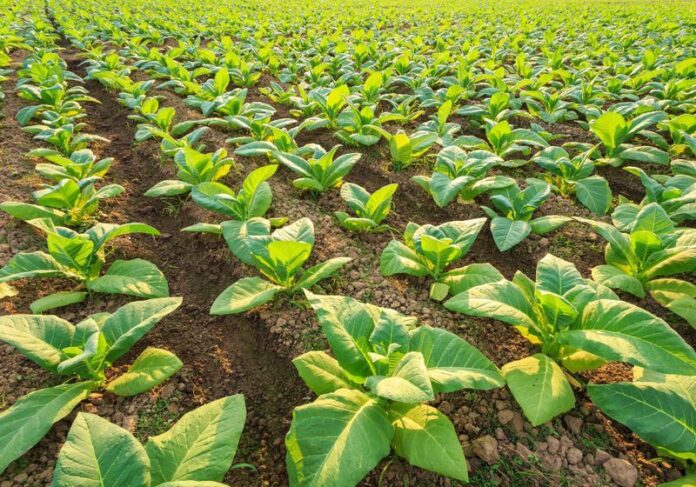
Talkmore Gandiwa
With pale faces carved with visible marks of sorrow, tobacco farmers sit patiently outside one of Zimbabwe’s tobacco auction floors in Harare, the capital city.
In their minds, all they are consumed with are the meager earnings they are likely to receive after their tobacco is sold on the auction season.
Some of them grow the country’s famous gold leaf on contract bases.
But, alas, despite the famed rich pickings associated with Zimbabwe’s second top foreign currency earner, most of the small-scale farmers are struggling.
They are being impoverished by the tobacco merchants who lure them into debt through contract farming.
After harvest and sales, the farmers are left entangled in debt while all their proceeds go to paying off their debts to local contract companies that supply them with farming inputs at the beginning of the season.
Zimbabwe is one of the largest tobacco producers in Africa, exporting US$782m in the 2020 season.
While tobacco is boosting Zimbabwe’s economy and making some people rich, the farmers sucked into contract farming at the bottom of the pile are losing money.
Thirty-five-old Shamva tobacco farmer Serina Maravanyika lamented the little money they earn after toiling for the better part of summer agricultural season.
She said they earn money which is even insufficient to pay their seasonal investment growing tobacco.
“Six months of our hard labour in the tobacco fields and our fate is being negotiated by someone else in the auction floors as we are not allowed to get inside because of the prevailing Covid-19 regulations,” Maravanyika said.
She said many families have failed to improve their standards of living, despite the hard and long hours they put in the tobacco fields.
“I only made a substantial profit in 2015 and I bought a few cows and a plough. We were being paid in hard currency but now we are getting our money in local currency which is always eroded by inflation,” she said.
Maravanyika said government should take action and put stiff requirements for one to register a contracting company to curb the mushrooming bogus and incapacitated fly-by-night contracting companies.
“The Tobacco Industry Marketing Board should look into the matter as a matter of urgency. They should make sure such incapacitated companies are banned from operating,” she said adding that these companies should also lose their operating licences.
She called for follow-up mechanism to make sure the contractors adhere to the board’s regulations and get banned for flouting the requirements.
“Government should also put up measures to stop the same companies from capturing farmers’ grower numbers without their consent.
“There is a lot of confusion when farmers attempt to market their produce especially during times like the COVID-19 pandemic where there are restrictions due to the national lockdown,” she said.
Another farmer, Charles Gweru said government should avail affordable loans for the farmers.
“Accessing loans and credit facility is the major problem that small farmers face. In as much as small farmers want to compete in agricultural, the challenges in accessing loans affect our ambitions,” he said.
Tobacco Farmers Union of Zimbabwe president Believe Tavera said contract farming turns farmers into slaves while enriching the contractors.
“Farmers are turned into workers for the contracting companies and they are always in credit, leaving them without surplus money to recapitalize and survive,” he said.
The contracting companies are accused of giving farmers insufficient inputs while some allegedly give farmers inputs do not add value to their business.
The contractors allegedly charge farmers exorbitant interest on the inputs.
“As if it is not enough, these companies offer farmers manipulative prices (wholesale prices) for high quality tobacco which does not empower the farmer to continue production.
“This is evidenced by the decrease in the hectarage of tobacco this season,” Tavera said.
He said contractors over charge small scale farmers such that they receive little money at the end of the season that will not sustain them into the next farming season.
“Contractors triple the amount of inputs that they give to the farmer but the farmer must sell the tobacco to the same contractor and they buy it at lower prices,” he said.
He called on government to avail inputs to farmers on low interest rates.
The difference between the official foreign exchange rate and parallel market also affects the small-scale farmers with input suppliers using the unofficial rate.
“Farmers get money on the official bank rate while goods are sold at the black-market rate. They are getting less money for production and they remain poor,” Tavera said.
As the 2021/2022 agricultural season beckons many small-scale tobacco farmers are still struggling to settle their debts.
Tavera also said some contractors are failing to pay farmers.
“Some of the farmers have begun to prepare for the next season but the future is doomed if we do not receive this money in time,” he said.
Government has, however, announced it was targeting to contract at least 50 000 hectares for tobacco production during the forthcoming summer season.
The area to be covered under contract tobacco farming will increase from 12 000 hectares put under the arrangement last season.
The project will be funded by local banks.
Tobacco prices during the 2021 marketing season increased this by 12 percent with at least 200 tonnes going under the hammer.
About 67 025 farmers have registered for the 2021/22 tobacco season compared to the 57 252 farmers last year reflecting a 17 percent increase.
Government has also approved the Tobacco Value Chain Transformation Plan aimed at transforming the tobacco value chain into a US$5 billion industry by 2025.
This is expected to be done through localisation of tobacco financing, increased production and productivity and exports of cigarettes.
The initiatives are also expected to contribute significantly to Zimbabwe’s GDP growth, foreign currency generation and employment creation, thereby raising household incomes in pursuit of Vision 2030.
The tobacco sector earns Zimbabwe close to US$1 billion.














